Research
Turkmenistan at the UN General Assembly: Highlights of the statements made at the general debates from 1992 till 2020
Authors: D. Ziganshina, A. Galustyan, D. Abasova
Experts from Turkmenistan: M. Akmuradov, B. Mamedov
Information collection: I. Belikov
Design: A. Degtyaryova
Prepared as part of the UNECE Project “Support to the Network of Russian Speaking Water Management Organizations” financed by the Government of the Russian Federation”
© UNECE, SIC ICWC, authors
In late 2020 - early 2021, on the occasion of the UN 75th anniversary, members of the Expert Platform made a review of speeches of Central Asian countries at general debates of the UN General Assembly over the period from 1992 to 2020. The objective of this study is to identify what issues the countries have addressed from the main world tribune and what initiatives they have pushed forward. A summary of Turkmenistan's speeches review is given below.
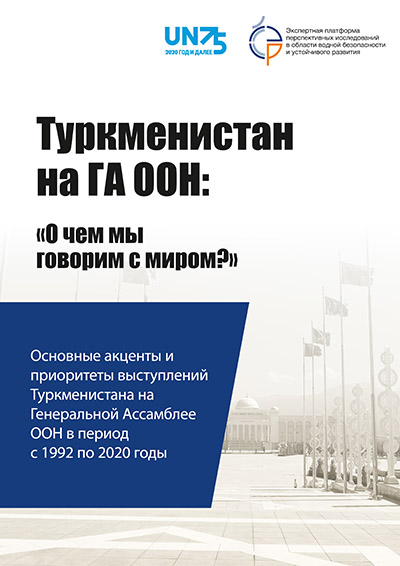
Over the almost 30-year history of attendance at general debates of the UN General Assembly, Turkmenistan has addressed different global and regional issues, while calling for strengthening of cooperation on energy, transport, communications and environment.
The most discussed issues included the following: Turkmenistan’s neutrality; the pivotal UN’s role in addressing issues related to global development and security; the need for the UN reform; and Turkmenistan’s vision on construction of a new world order. The next block of priority issues deal with political, economic and democratic transformations in the country. Regional cooperation in Central Asia, problems related to the Caspian Sea and efficient use of the sea’s great wealth, and ecology and sustainable development close the top ten list. Terrorism, drug trafficking, the situation in Afghanistan, environmental issues, and water and energy management were among the most disturbing regional concerns of Turkmenistan.
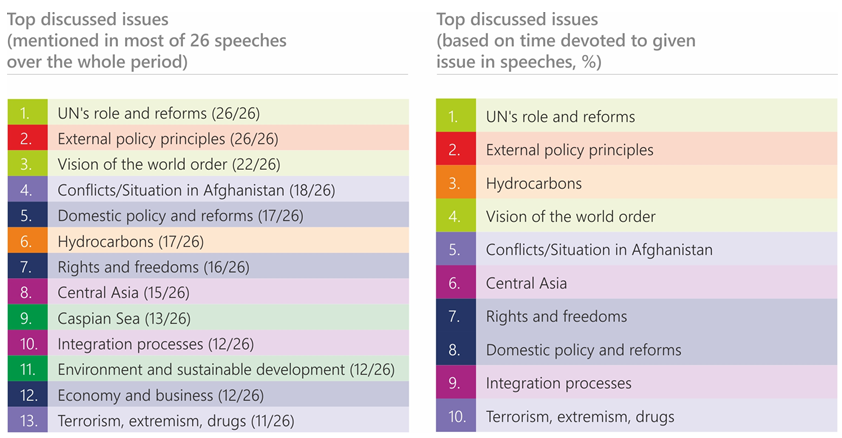
Thematic priorities by decade
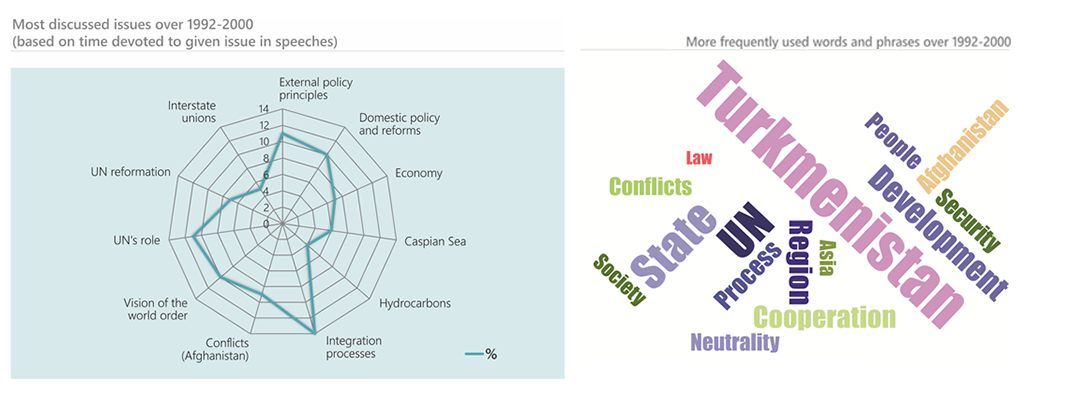
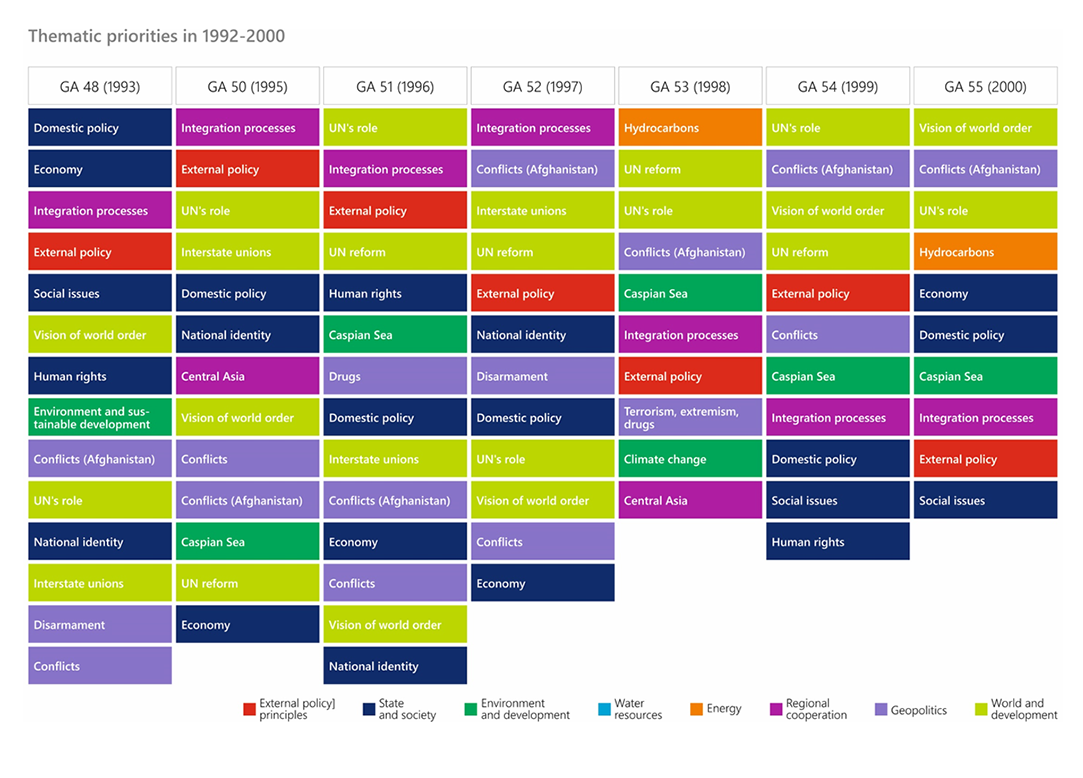
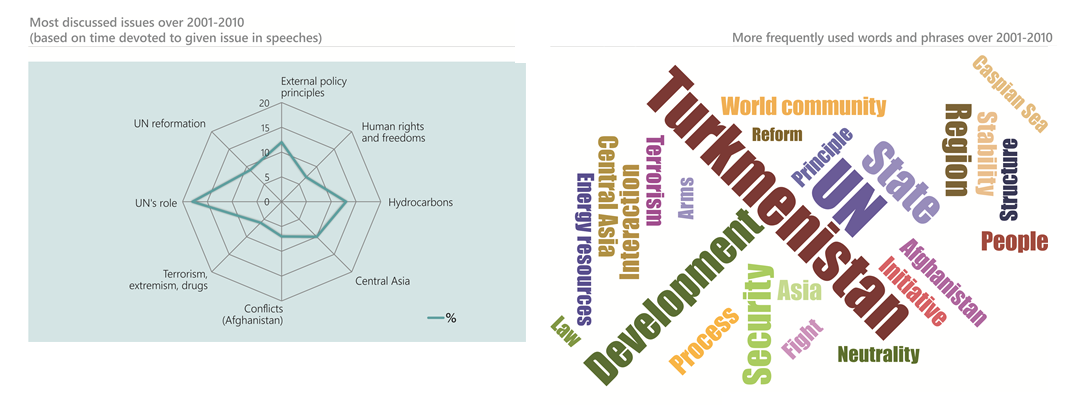
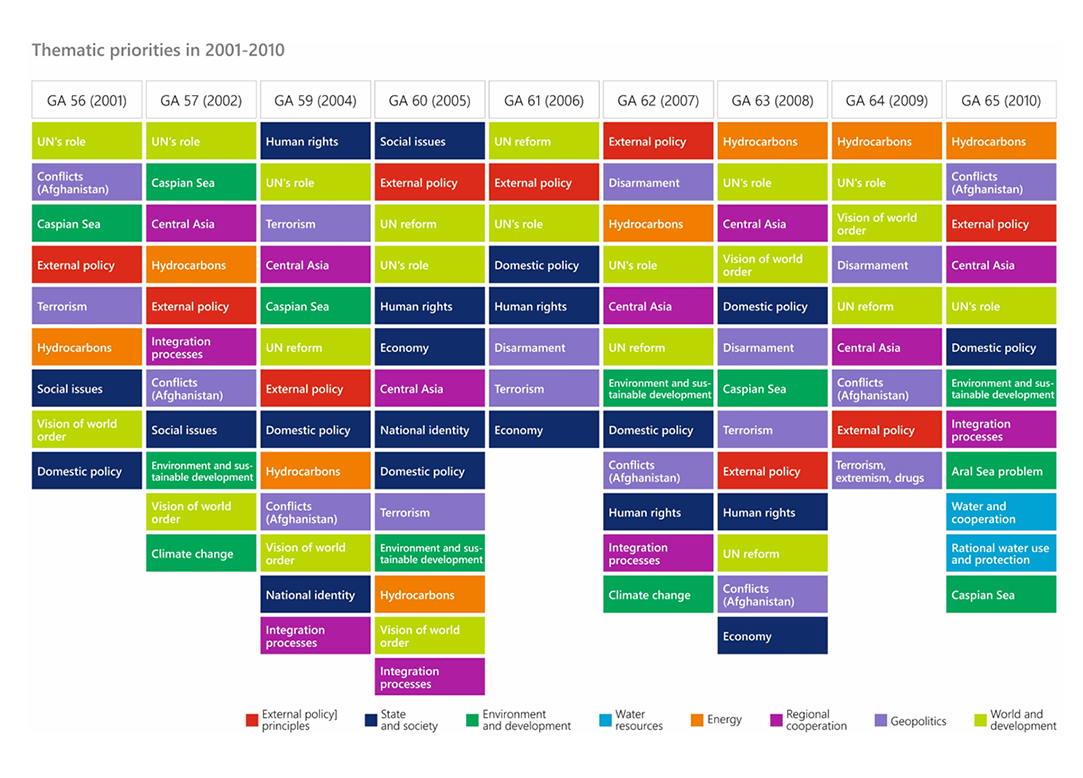
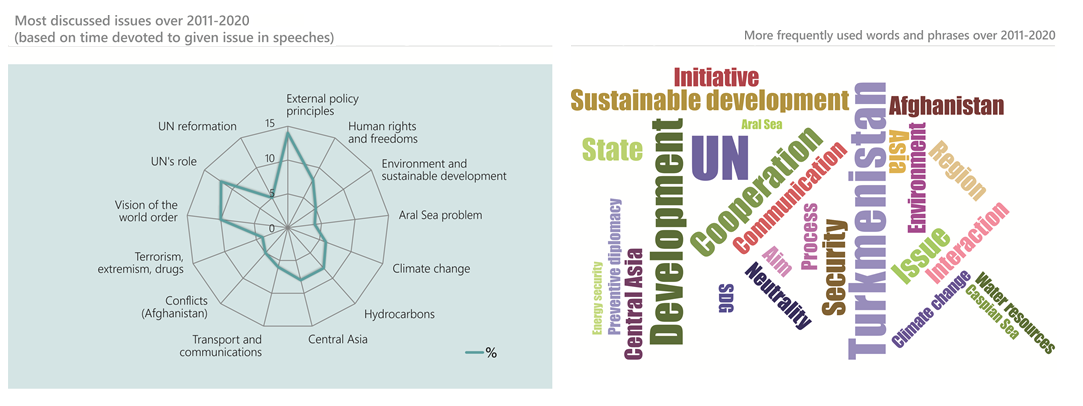
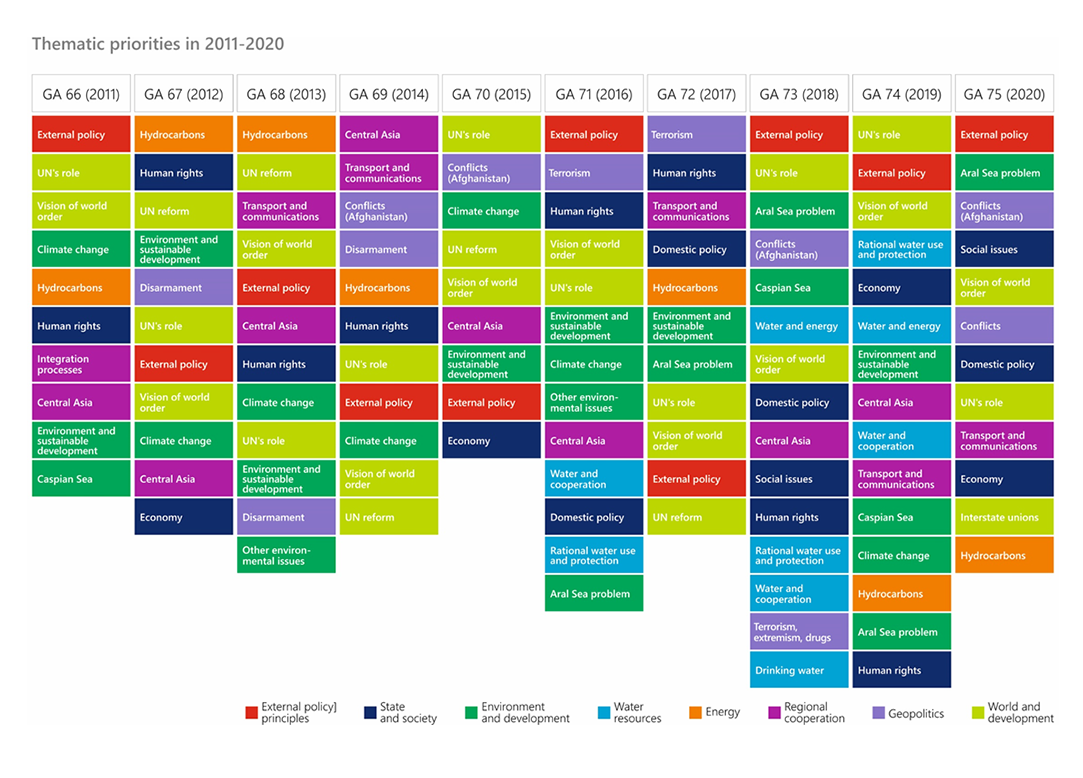
The key initiatives put forward by Turkmenistan at UN GA demonstrate the main principle of the country’s foreign policy, namely permanent positive neutrality and adherence to political and diplomatic tools for the resolution of international issues. Turkmenistan placed special emphasis on the establishment of an international legal framework to protect the interests of the energy producers, transit countries and consumers and on the development of transportation and transit corridors.
Key initiatives put forward by Turkmenistan at UN GA
- Establishment, under the UN auspices, of an international centre for political studies in Turkmenistan(51/1996)
- Development of an international legal framework to protect the interests of the energy producers, transit countries and consumers, including operation mode of interstate pipelines (53/1998, 55/2000, 56/2001, 57/2002, 63/2008, 67/2012, 75/2020)
- Resolution 63/210 “Reliable and stable transit of energy and its role in ensuring sustainable development and international cooperation”, 19 December 2008;
- International Conference “Reliable and Stable Transit of Energy and its Role in Ensuring Sustainable Development and International Cooperation” in Ashgabat (April 2009);
- Resolution 67/263 “Reliable and stable transit of energy and its role in ensuring sustainable development and international cooperation”, 17 May 2013;
- Establishment of an international expert group for energy security and sustainable energy for the development of the international legal framework, 2017.
- Establishment of the Energy Council of the UN (65/2010)
- Establishment of a Regional Advisory Council of the Heads of Central Asia State (57/2002, 59/2004, 66/2011, 68/2013)
- Establishment of a UN regional centre for preventive diplomacy for Central Asia (59/2004)
- Organization of an international conference on disarmament issues in Central Asia and the Caspian Sea Basin (64/2009)
- Establishment of a High-Level Forum on Security, Peace and Cooperation in Central Asia and the Caspian Basin (65/2010, 66/2011, 68/2013, 69/2014)
- Development and adoption of a UN Declaration on prior use of political and diplomatic means in dealing with international issues (66/2011, 68/2013, 69/2014)
- Development of a UN special program on transport development (66/2011)
- Establishment of a regional centre on climate change adaptation and climate technologies in CA and the Caspian basin under the UN auspices in Ashgabat (66/2011, 67/2012, 68/2013)
- Establishment of a Caspian ecoforum (66/2011)
- Hosting of a consultation meeting on disarmament under the UN (67/2012, 68/2013)
- Establishment of a UN sub-regional centre on disarmament in Asia (67/2012, 69/2014)
- Development of a UN platform of action for humanitarian matters (67/2012)
- Hosting of an international high-level conference on the role of transport-transit corridors to ensure international cooperation (68/2013)
- Declaration of the International Neutrality Day (71/2016)
- Declaration of the International Year of Peace and Trust (73/2018, 75/2020)
- Development of a UN Special Program for the Aral Sea basin and taking the Aral Sea topic as a separate area of work for the United Nations (73/2018, 74/2019, 75/2020)
- Development of a UN Code of Practice on the effective use of the principles of neutrality in resolving international issues (74/2019)
- Hosting of an international forum on peace and trust (75/2020)
- Initiatives to be undertaken under WHO auspices: (1) establishment of a WHO special program on studying coronavirus genome; (2) development of a multilateral mechanism to fight pneumonia; (3) establishment of a methodological center for treatment and prevention of acute infections (75/2020)
Among the most important environmental issues raised in Turkmenistan’s statements were the Aral Sea problem, climate change, desertification and water use in the region. Turkmenistan put forward the initiative on development of a UN Special Program for the Aral Sea basin, proposed establishing the regional centre on climate change adaptation and climate technologies in CA and the Caspian basin under the auspices of the UN and called for the unequivocal commitment to the principle of equal and equitable access to water and recognition of the latter as the fundamental human right. The UN GA resolution on cooperation between the United Nations and IFAS was adopted upon Turkmenistan’s initiative: A/RES/72/273 Cooperation between the United Nations and the International Fund for Saving the Aral Sea (2018) and A/RES/73/297 “Cooperation between the United Nations and the International Fund for Saving the Aral Sea” (2019)
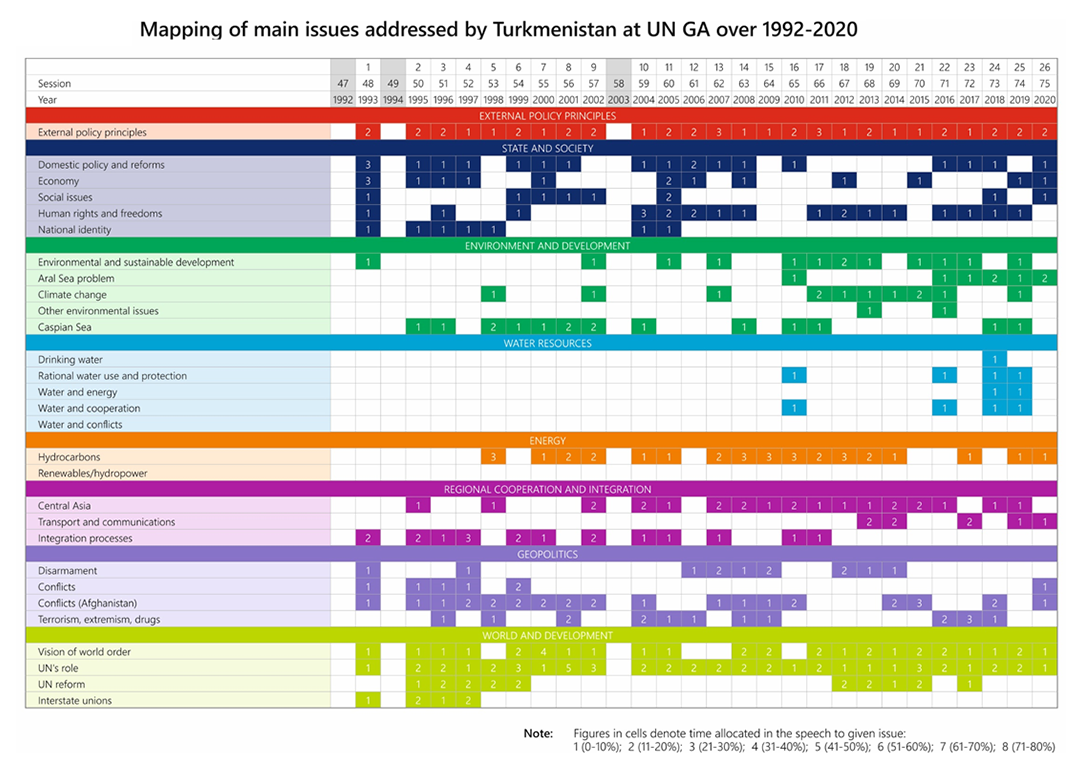
Experts’ opinion
Experts name the key advances of the Turkmen diplomacy in the UN to include the recognition of the status of positive neutrality, establishment of the UN Regional Centre on Preventive Diplomacy for Central Asia, proposal on the development of the UN Special Program for the Aral Sea basin, and achievement of tangible results in the area of regional cooperation and integration through the new formats of political communication and regional dialogue. Thus, in 2002, this was the President of Turkmenistan, who for the first time voiced the idea of establishing a regional advisory council of the heads of Central Asia state, and this idea materialized in 2018.
In experts’ opinion, among the major risks for the region and the world as a whole are the climate change and the related water scarcity. Using the political platform of the UN GA for strengthening of regional cooperation in order to reduce these risks is relevant for Turkmenistan's future addresses from this high rostrum.
The experts see the need to concentrate on the development of cooperative mechanisms between the countries at the regional and sub-regional levels as the main focus of Turkmenistan's future work with the UN. One of first steps in this direction could be the development of the UN Code of Practice on the effective use of the principles of neutrality in resolving international issues as proposed by Turkmenistan. The developed Regional Program on Environmental Protection for Sustainable Development of Central Asia for the period of 2020-2030 could also serve as a framework for regional cooperation.
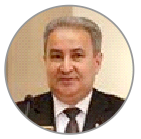 M. Akmuradov:
M. Akmuradov:
“The initiative of Turkmen President Gurbanguly Berdymukhamedov to create a UN Special Program for the Aral Sea Basin, which could make the Aral Sea problem a separate area in UN activities, is a great success of Turkmen diplomacy. This way, the major regional problem of Central Asia will get the greatest interest and support of the whole world community”.
 B. Mamedov:
B. Mamedov:
“Given the natural and climatic conditions of the countries in the region and water forecasts, as well as the socio-economic importance of agriculture, it is advisable to shift to a new concept of agricultural development by harmonizing this sector with the natural environment and reaching a trust-based regional division of labor for provision of food and energy”.
